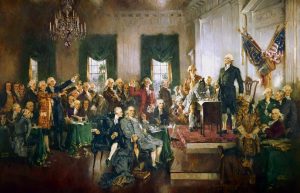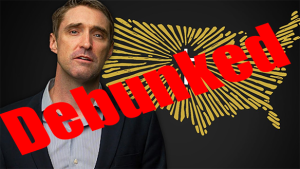Stephen Wolfe is the author of The Case for Christian Nationalism. He also has a YouTube channel called The Lone Bulwark, where he posted a video titled, The Moral argument for Christian Nationalism.
The Moral Argument For Christian Nationalism
In the video Wolfe presents a four-point argument in defense of Christian Nationalism as a political ideology:
- All moral entities ought to acknowledge the true God in word and deed.
- Nations are moral entities.
- Therefore, nations ought to acknowledge the true God in word and deed.
- The true God is the Triune God. Therefore, nations ought to acknowledge the Triune God in word and deed.
At first glance, this seems like a solid logical argument. When analyzed more closely, we realize it is a series of assumptions built on a foundational falsehood. Let’s go through it step by step.
1. All moral entities ought to acknowledge the true God in word and deed.
True. One thing we should keep in mind, however, is that all moral entities are called to acknowledge God in thought, word, and deed, but not all moral entities acknowledge God in the same way. Stephen himself points out that we acknowledge God specifically by following his laws and commandments:
“Acknowledging God goes beyond mere affirmation of His existence. It means beseeching Him, recognizing dependence, and acting in light of His purposes. Since all moral entities are under moral obligation, they ought to acknowledge God in word and deed, because obligation itself flows only from His will.”
This is true, but different moral entities are commanded by God to acknowledge him in different ways. For example, an Angel acknowledges God differently than a Human acknowledges God. This can be true even on an individual level. God forbade David from building the Temple (1 Chronicles 22:8) but permitted Solomon, even though David was the one whom God loved (Acts 13:22). A more relevant modern example is that a married man acknowledges God differently from a man who is single.
2. Nations are moral entities.
False. Here is how Stephen Wolfe defines a morale entity:
“The key is understanding the nature of moral entities. Moral entities are required to do good and not do evil. Much of creation consists of non-moral entities—rocks, for example, or non-rational animals like bears. These do not choose between good and evil. Moral entities, however, can recognize good and evil and make choices.”
We talk about nations doing things that are right or wrong as an anthropomorphism. In scripture God repeatedly pronounces Judgement on Israel, but always has his remnant who are protected from his wrath (Malachi 3:16 – 18). Does this mean the remnant has ceased to be part of the nation of Israel? No. God is acknowledged not by the nation itself but by how individuals interact with each other when functioning as a nation.
Is my local bait shop a moral entity? Of course not. As a customer, can I acknowledge God in how I interact with the bait shop? Yes. If I rob the bait shop, if I yell at the front desk clerk, if I throw a tantrum and make a mess, I am certainly not acknowledging God in that relationship.
“Nations are collective entities because they can form political communities by consent, and consent expresses collective personhood. A nation, therefore, has a kind of moral personality, acting as one through laws and decisions.”
The Nuremberg trials saw Nazi officers executed for war crimes. It was here that it was determined that “following orders” did not absolve these men of their sins. Why then did we not go through and execute every last German? Why not hold the peasants responsible for growing crops that fed the guards at Auschwitz? Because a nation is not itself a moral entity, it is an abstract relationship by which moral entities interact with one another.
3. Therefore, nations ought to acknowledge the true God in word and deed
False. Just as different moral entities acknowledge God differently, we acknowledge God differently depending on the relationship we have with an individual. Going back to the bait shop, the cashier acknowledges God differently as an employee then I acknowledge God as a customer. God commands him not to grumble or complain, even though his boss asks him to do things that aren’t in his Job description. On the other hand, If the owner of the bait shop asks me to scrub the toilets, I am under no such obligation.
Scripturally, the basis for all earthly authority is the relationship between parent and child as described in the Ten Commandments (Exodus 20:12). If you had the President of the United States show up at your house and start trying to spank your kids, your first thought probably won’t be “What a Good God Honoring Man”.
4. The true God is the Triune God. Therefore, nations ought to acknowledge the Triune God in word and deed.
True. All things ought to acknowledge God. The Government, when properly exercising its authority, acknowledges God by protecting us, seeing to our security, freedom, and welfare so that we may worship God as commanded by Him and interpreted by his Church. So that we may acknowledge him free of Persecution. Likewise, scripture calls us to submit to earthly authorities (Romans 13:1-5) with two exceptions.
- They can not force us into sin. No one can, not even God. (Job 34:10 – 15)
- They can not tell us how we are to worship God. This authority resides in Christ, the Son of God, the King of Kings, our Great High Priest. (Deuteronomy 12:32, Matthew 15:9, John 4:23-24)
True worship is done through the Spirit and in truth. These are things that the nations have no power over. The kingdoms of the earth can not control or discipline man’s spirit (more about that here). When we proclaim Christian Nationalism, we try to give the earthly authorities power that God himself has not given them.
“The next premise is that the true God is the Triune God. Nations, therefore, must acknowledge not only God in general but specifically the Triune God. Some might argue nations need only acknowledge God as Creator. But in Christian theology, God as Creator cannot be separated from God as Redeemer.”
Yes, acknowledge Christ the redeemer who redeemed us through the saving power of his Grace. Christ did not come to the earth and govern it, even though it was fully his right to do so. Nor did he command his apostles to expand the church through power and conquest. Instead, he came down as a carpenter and showed forgiveness and patience to prostitutes, pagans, and thieves. Then he died on the cross, washing away the sins of those whom he loved, and three days later, was resurrected, having conquered death.



